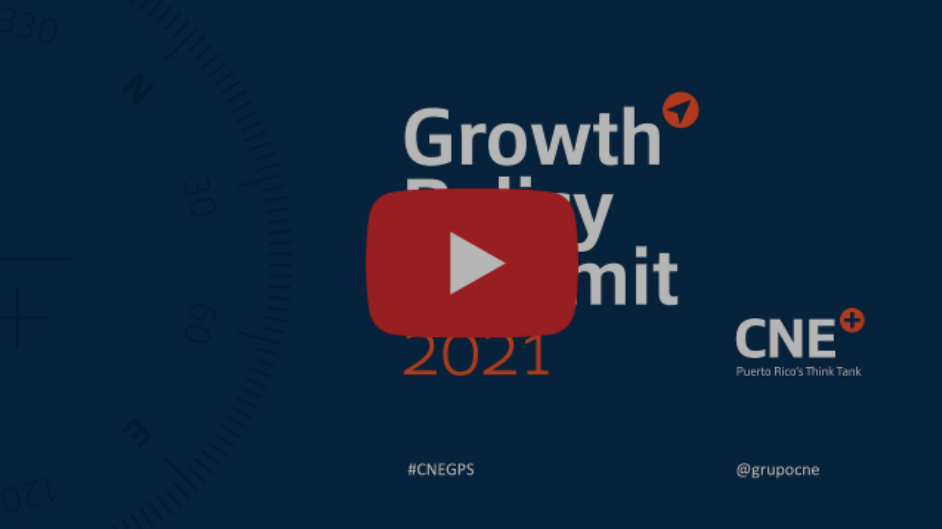
Published on January 27, 2022 / Leer en español
In This Issue
It seems like it was only yesterday we were hearing for the first time about a strange new virus that affected the respiratory system. The past two years have gone by in a blur of adaptation (social distancing, wearing masks, using Zoom, mass vaccinations), upended routines (working from home, long-distance learning), and much COVID-related suffering.
As we begin the new year, you would be justified in being perhaps just a touch apprehensive about what 2022 has in store. No one really knows when the pandemic will be “over” (if we can use that term) and its economic, political, and social effects will play out only after several years. In light of such uncertainty, it is perfectly normal to be anxious about, well, pretty much everything.
Yet, as 2022 begins there is reason to believe that while we may need to keep adapting to new realities, the new year may also bring some positive developments for Puerto Rico. With that in mind, we present some themes to watch out for in 2022.
–Sergio M. Marxuach, Editor-in-Chief
Insights + Analysis from CNE

Six Topics to Watch in 2022
By Sergio M. Marxuach, Policy Director
- The Pandemic – The SARS-CoV-2 virus has consistently confounded some of the brightest scientific minds since it was first identified two years ago. It is also true, though, that our knowledge about the virus has grown exponentially during that time. In addition, we also have a better clinical understanding of the disease’s progression and have developed vaccines as well as new treatments for COVID-19. Nonetheless, we still have a ways to go before we can claim that COVID-19 is just another disease we can live with, like the flu. This is particularly true in the global South, where vaccination rates are still pitifully low. In the meantime, we know what we have to do: wear masks, keep social distancing, get vaccinated, and carry on.
- Puerto Rico’s Debt Restructuring – After five years of litigation and negotiation, Judge Laura Taylor Swain has confirmed a Plan of Adjustment for the debt of Puerto Rico’s central government. The proposed Plan of Adjustment is not perfect and it has been the subject of significant criticism. But it does offer some debt relief and lifts the bankruptcy cloud from Puerto Rico, which should be a net positive for people looking at potential investment in Puerto Rico. It is a really difficult task to determine, with any certainty, whether the proposed plan is adequate, the time horizon is too long and there are too many variables. We believe that both the best case scenario put forward by the FOMB and the worst case scenario favored by those who oppose the Plan are unlikely to occur. In real life, it is likely some things will be in our favor and others against. The difficulty lies in forecasting which variables will go which way. What we do know, is that everything depends on jumpstarting economic growth and that depends, in the short term, on the Hurricane Maria reconstruction process and, over the long term, on developing and implementing an economic growth plan for Puerto Rico.
- Hurricane Maria Reconstruction – It appears that 2022 will finally be the year when we start to see some significant new spending on reconstruction projects, especially in the housing and energy sectors. Hopefully, some of the obstacles imposed by the federal government have been cleared and the money can start flowing. Some difficult decisions regarding what gets rebuilt and what not and about energy generation technologies still lie ahead, though. In this sense, some of the most difficult questions in the reconstruction process are not technical but rather political in nature, as different groups vie with each other to push their own (interested) vision of how the reconstruction should play out.
- Mid-Term Elections – The entire U.S. House of Representatives and about a third of the Senate are up for reelection this fall. Most analysts and polls forecast that Republicans will gain control of at least one Congressional chamber, if not both. If that scenario is realized, any pending federal legislation extending or increasing federal spending in Puerto Rico, for example, extending SSI benefits to Puerto Rico or increasing the federal share (FMAP) of Medicaid costs, could be in jeopardy. In addition, under a Republican majority, Puerto Rico could even face the rescission of budgetary authority for certain programs or the reduction of funds already appropriated for certain uses. Thus, it is important that the Pierluisi administration move aggressively to push the Puerto Rican agenda in Washington, D.C. during the next few months. Once campaigning starts in earnest after the summer break, it may be too late.
- Inflation – Consumer prices are increasing at a rate not seen in forty years. This is due, in part, to the success of economic support measures in propping up demand when the COVID-19 pandemic struck. Central bankers provided huge amounts of liquidity to financial markets. Governments borrowed on a scale unseen since the second world war. In the United States alone, budget deficits exceeded 12% of GDP in both 2020 and 2021. All this stimulus prevented demand from plunging. Supply has been a different story, as the pandemic disrupted production worldwide. Supply chain bottlenecks and scrambled logistic networks led to unprecedented backlogs and delays, even as demand for physical goods increased relative to demand for services as people sheltered in place. Hence the price increases. In addition, firms in the developed world face a labor shortage, as workers, for reasons we don’t really fully understand, don’t return to work—there are 3.6 million fewer people working in the United States today than in February 2020. Economists disagree (big surprise here) as to whether this recent inflationary trend is a temporary or permanent phenomenon. On the former camp are those who emphasize supply dislocations that should eventually reverse themselves, while those on the latter side point to the risk of an inflationary wage spiral taking hold. Jay Powell, chairman of the Federal Reserve, stated recently that he (and the Fed Board of Governors) are uncomfortable with current price trends and the expectation is that interest rate increases are in the offing. It remains to be seen whether the Fed can tame inflationary pressures without inducing a recession or provoking a plunge in asset prices.
- The Return of Geopolitics – As 2022 begins, Russia is threatening to invade Ukraine, China is taking an increasingly assertive position in the South China Sea, and North Korea has tested new missiles. In addition, illiberal autocratic forces seem to be on the rise around the world. The strength of these movements will be tested in general elections in Brazil, France, Hungary, and in the midterms in the United States. At the same time, China is increasingly confident that its system is superior at promoting stability, growth, and innovation, especially in contrast with a divided and dysfunctional United States. Any intensification of the rivalry between China and the U.S. will affect us, as Puerto Rico’s future, for better or worse, is tied to the United States.

From Madrid: On the Radar for 2022
By Jennifer Wolff, Ph.D., Director, Madrid Policy Bureau
The first month of the year is a good time to review, so we take this opportunity to outline some of the discussions that we will be following closely from Spain that may shed light on key issues for Puerto Rico during this year that has just begun.Click here to read the article in Spanish.
Growth Policy Summit 2021 Highlights
Click the video to watch highlights from the Growth Policy Summit 2021
On Our Radar...
![]() Conflicts to Watch in 2022 – The Biden administration is confronting several acute humanitarian crises this year amid growing tensions with China, Iran, and Russia, according to the Council on Foreign Relations’ (CFR) fourteenth annual Preventive Priorities Survey. The survey “finds an alarming trend: severe food shortages, diminished foreign aid, political instability, and deteriorating economic conditions are accelerating humanitarian and refugee crises around the world.”
Conflicts to Watch in 2022 – The Biden administration is confronting several acute humanitarian crises this year amid growing tensions with China, Iran, and Russia, according to the Council on Foreign Relations’ (CFR) fourteenth annual Preventive Priorities Survey. The survey “finds an alarming trend: severe food shortages, diminished foreign aid, political instability, and deteriorating economic conditions are accelerating humanitarian and refugee crises around the world.”
![]() Schools and COVID – ”Children face learning loss, with studies showing that they are behind in math and reading, and face setbacks in social-emotional development due to disrupted in-person instructional time. A third-grader hasn’t had regular school since kindergarten, for example. A 12th-grader hasn’t had a regular year since ninth grade. Missed milestones for younger children include skills like learning to work in groups, lining up and moving into classrooms and eating lunch in cafeterias,” according to a recent story from the Wall Street Journal.
Schools and COVID – ”Children face learning loss, with studies showing that they are behind in math and reading, and face setbacks in social-emotional development due to disrupted in-person instructional time. A third-grader hasn’t had regular school since kindergarten, for example. A 12th-grader hasn’t had a regular year since ninth grade. Missed milestones for younger children include skills like learning to work in groups, lining up and moving into classrooms and eating lunch in cafeterias,” according to a recent story from the Wall Street Journal.
![]() The Decline of American Conservatism – Writer David Brooks laments the current state of the American conservative movement in general, and the Republican Party in particular, in this interesting essay for The Atlantic.
The Decline of American Conservatism – Writer David Brooks laments the current state of the American conservative movement in general, and the Republican Party in particular, in this interesting essay for The Atlantic.

